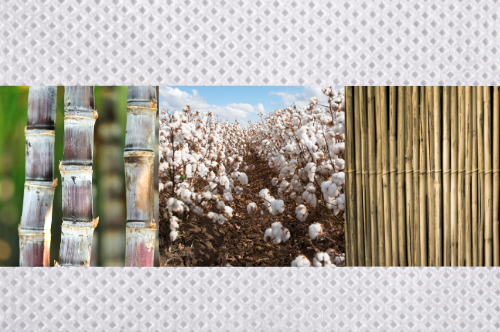“Nonwovens” is a term used to refer to fabrics that are neither woven nor knitted, but rather bonded together by various chemical and mechanical treatments. These fabrics are specially engineered by entangling fiber or filaments mechanically, thermally, or chemically. Nonwovens have a number of applications in fields such as medicine, pharmaceuticals, oil and gas, farming, hygiene, apparel, and more.
Due to the nature of nonwovens, they are often used in disposable products like diapers, wipes, and feminine hygiene products. In recent years, as more people become cognizant of issues like landfill waste and climate change, there have been increasing calls for manufacturers to use more sustainable materials in the production of nonwovens. And to manufacturers’ credit, they are answering these calls. Let’s take a look at some of the plant-based, sustainable ingredients being used in nonwovens on an increasingly large scale.
Sugar Cane
Several manufacturers are now sourcing sugar cane as a key ingredient in biodegradable, compostable nonwoven products. For example, the patented One Earth tea bag is made from sugar cane and holds tea leaves in a fully biodegradable and compostable sack. Sugar cane fibers have also been used in the production of nonwoven mats used to control soil erosion in agriculture.
Bamboo
When you think of bamboo, you probably think of its pretty appearance and use in landscaping – not its role in product manufacturing. But bamboo is quickly becoming an important player in the nonwovens industry. It is super absorbent, making it perfect for both wet and dry cleansing wipes. Mammoth Wipes, which are made of fully biodegradable bamboo, is a favorite among hikers and adventurers because they are 25 times larger than the average facial wipe and are designed to clean the whole body. Bamboo is also used in the manufacturing of nonwoven apparel and home fashion textiles.
Cotton
Cotton is completely biodegradable and compostable, making it an attractive fiber for manufacturers looking to minimize environmental impact. In addition, cotton farming is increasingly sustainable, with most U.S. cotton crops surviving on rainfall only and relatively few pesticides. Cotton’s pillow-soft feel makes it a favorite among consumers and manufacturers alike. It is both more comfortable and more sustainable than the petroleum-based fibers used in nonwovens of the past. Companies that produce eco-friendly feminine hygiene products love cotton for its sustainable properties.
Natracare, for example, has gone completely plastic-free in its production of pads and tampons, opting instead for cotton. It is also used to make more sustainable diapers, baby wipes, and adult incontinence products.
At Barnhardt, we clean our cotton using EVŌC, a series of highly advanced cleaning technologies, and then purify it in a totally chlorine-free (TCF) process. This ensures the absolute safety and purity of all our cotton products before they reach consumers. Our cotton performs in both hydrophobic and hydrophilic applications and available in conventional or organic versions.
Why It Matters
The increasing role of sustainable, plant-based ingredients in nonwovens is a crucial development. This is because industries, like the nonwovens industry, play a huge part in the future of our planet. Whole industries have a much larger potential effect on the planet than any one person ever could. Therefore, their sustainability efforts – or lack thereof – are highly consequential, and they have a responsibility to be stewards of the environment. Nonwoven product manufacturers’ efforts to switch to more eco-friendly, plant-based materials like sugar cane, cotton, and bamboo will go a long way in reducing landfill waste and environmental impact. We applaud the nonwovens industry for these efforts and look forward to seeing more companies get creative with sustainability.
